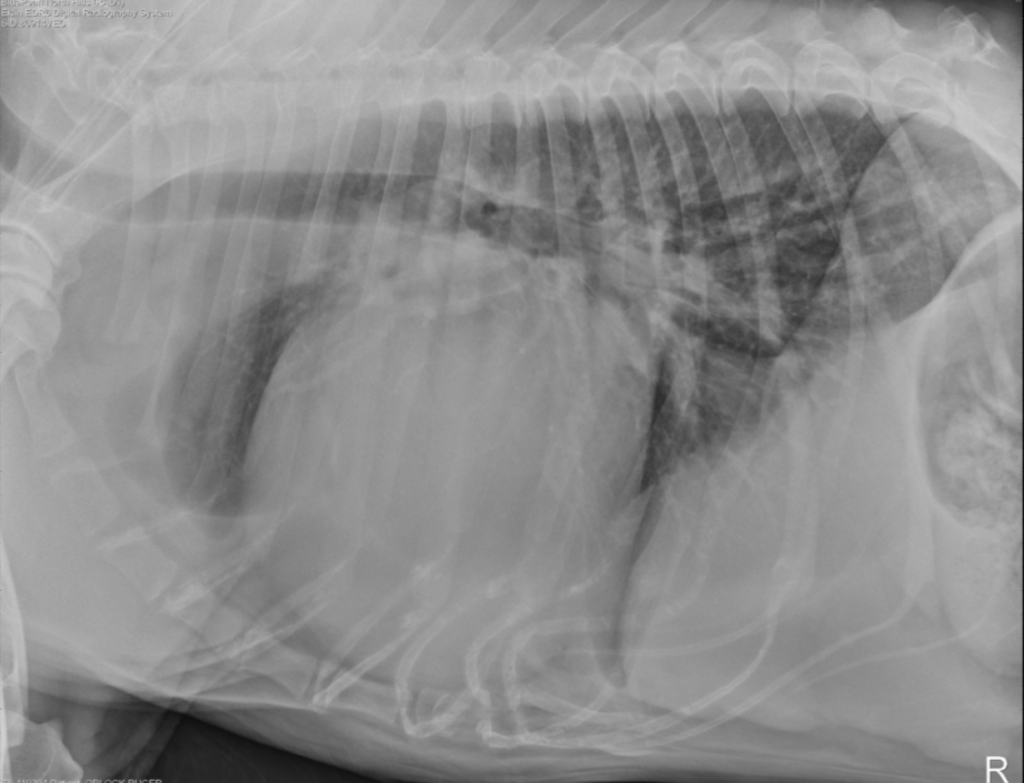Erin Anderson, VMD, MSc, DACVIM (cardiology)
Pittsburgh Veterinary Cardiology
March 2019
Lately, there’s been a lot of discussion about a potential association between grain-free diets and dilated cardiomyopathy (DCM) in dogs. We’d like to address this concern with the most up-to-date information currently available.
Dilated cardiomyopathy (DCM) is a serious and unfortunately rather common kind of heart disease characterized by weakening of the heart muscle cells and enlargement of the heart. Dogs with DCM can experience exercise intolerance, coughing and trouble breathing associated with congestive heart failure, or arrhythmias (abnormal heart rhythms) causing sudden death. DCM is most commonly seen in large breeds (Doberman Pinschers, Great Danes, Irish Wolfhounds, Boxers), where there is a known or suspected genetic component. Recently, though, astute cardiologists started seeing a higher rate of DCM in less common breeds – like Golden Retrievers, Miniature Schnauzers, and Shih Tzus- and ultimately became suspicious of a potential common link among the affected dogs’ diets. These atypical breeds were all consuming “boutique” brand diets, those containing exotic or limited ingredients, or diets labeled as grain-free (“BEG” diets). Currently, the US Food and Drug Administration (FDA) Center for Veterinary Medicine is actively investigating cases of potential diet associations in dogs with DCM.
It is critical to recognize that this is an ongoing investigation and that our suspicions are not certainties. We’re exercising caution because DCM is devastating and any reasonable preventative measure (a change in food!) is worth considering.
What we know:
- The original investigation included 24 Golden Retrievers in California with DCM. Over the past two years, veterinary cardiologists have identified an additional 240 cases of diet-associated DCM in 29 other breeds. These dogs were all being fed grain-free diets, “boutique” brands, or foods with exotic ingredients – kangaroo, lentils, duck, pea, fava bean, buffalo, tapioca, salmon, lamb, barley, bison, venison, and chickpeas. Vegan, raw, and home-prepared diets have also been reported.
- Some (but not all) dogs with DCM eating BEG diets were shown to have low blood levels of an amino acid called taurine. Taurine deficiency has been implicated in DCM since 1987 when we learned that cats have a higher dietary demand for taurine since they cannot synthesize it on their own. When taurine was supplemented in feline diets, the cardiac changes improved. Now, commercial cat foods are supplemented appropriately and the rate of taurine-deficient DCM in cats has plummeted. The original group of Golden Retrievers who sparked this new controversy (as well as many Cocker Spaniels) had low blood taurine levels, but not all dogs with DCM on BEG diets do.
- Diet change and taurine supplementation resulted in improvement in both symptoms and echocardiographic variables of disease in affected dogs over 8-12 months of follow-up. Many of these dogs had medications reduced or discontinued altogether, an unlikely occurrence in DCM due to its traditionally irreversible nature.
What we don’t know:
- How BEG diets affect taurine levels. Possibilities include low levels of taurine or its metabolic precursors; reduced availability, poor absorption, or altered metabolism of taurine owing to non-traditional ingredients like legumes, potatoes, or rice bran or to their interactions with normal intestinal microbes.
- Factors other than taurine deficiency that may implicate BEG diets in DCM. As in the cases of diet-associated DCM in dogs with normal taurine levels, we acknowledge that the problem may not arise from what isn’t in the food, but from what is. Commonly used but less well-studied exotic ingredients may pose problems with bioavailability or interactions with other ingredients or have inadvertent cardiotoxic effects.
- How many or which dogs on BEG diets are at risk for DCM. These diets have recently exploded on the marketplace, and they are likely being fed to millions of dogs, many of whom do not develop DCM. Additional risk factors have yet to be identified.
What we can do:
- If dogs on BEG diets are experiencing any symptoms of DCM (exercise intolerance, cough or trouble breathing, fainting or looking “light-headed”), seek prompt veterinary care. This should include a thorough physical exam, radiographs of your dog’s heart, measurement of blood taurine levels, and –ideally- referral to a veterinary cardiologist for an echocardiogram, the definitive means of diagnosing DCM.
- Dogs diagnosed with DCM should be treated with a diet change and taurine supplementation and may require additional medications depending on the extent of cardiac changes. There is no one perfect diet for every dog. Currently, veterinary nutritionists advocate that affected dogs are transitioned to a diet made by a well-established, reputable company which contains “standard” ingredients (chicken, beef, rice, corn, wheat). The diet should include the Association of American Feed Control Officials (AAFCO) Nutritional Adequacy Statement labeling it as “complete and balanced nutrition.” (Notably, all BEG diets being fed to the sentinel 24 Golden Retrievers were AAFCO approved, so this label is not exclusive validation of a “safe” food.) Raw and homemade diets are not encouraged as they may increase the risk of other nutritional deficiencies or infectious disease. Helpful resources for critically examining pet foods include: http://vetnutrition.tufts.edu/2016/12/questions-you-should-be-asking-about-your-pets-food/ and https://www.wsava.org/WSAVA/media/Arpita-and-Emma-editorial/The-Savvy-Dog-Owner-s-Guide-to-Nutrition-on-the-Internet.pdf The needs of dogs with additional special dietary considerations are best met in conjunction with a veterinary nutritionist (acvn.org).
- The cases of affected dogs should be reported to the FDA: https://www.fda.gov/animalveterinary/safetyhealth/reportaproblem/ucm182403.htm Samples of the associated food should be saved, along with original packaging. Ideally, samples and packaging of all treats, chews, and supplements should also be saved.
- If dogs on BEG diets are not experiencing symptoms of DCM, it may still be worthwhile reconsider your dog’s diet. Even as we work to better understand the link between diet and DCM, it’s important to know that DCM is serious and often fatal. This risk probably outweighs any perceived benefit of a grain-free diet. Grain restriction is not supported by any reputable nutritional science, and it likely gained traction as a fad in the pet-food industry because of creative (and powerful) marketing. While some dogs with allergies may respond to dietary change, there is no evidence that grain is the source of the sensitivity.
- Stay open-minded, well informed, and savvy about the source of your information. Avoid dogma and anecdotal reports of what is “good” and “bad” – very few things, including diets, are solely one or the other. As the veterinary community works to better understand diet-associated DCM, we bring you these concerns not to vilify brands or kinds of food but because we are advocates for the best interest of your dog.



